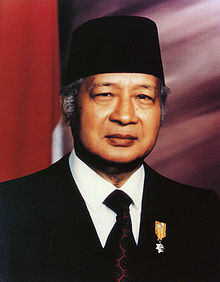From: MAO: THE UNKNOWN STORY, pp. 606-08
By Yung Chang and Jon Halliday, 2005
...impatient for success, Mao tried to ignite violent insurrection wherever he could. In Thailand, the Communist Party fostered by Mao (and composed overwhelmingly of ethnic Chinese) now launched into armed insurgency, clashing for the first time with government forces on 7 August 1965, thenceforth known as "Gun-Firing Day". It got nowhere.
The biggest -- and most tragic -- fiasco came in Indonesia. The Communist Party there, the PKI, was the largest in the non-Communist world, with some 3.5 million members, and had the kind of secret relationship with Peking which the Chinese Communists had had with Stalin before they conquered China. * The head of the Japanese Communist Party at the time, Kenji Miyamoto, told us that Peking continually told the PKI, the Japanese Party: "Whenever there is a chance to seize power, you must rise up in armed struggle". In 1964, Miyamoto discussed this with Aidit [an Indonesian Communist leader]. Whilst the Japanese Communists were cautious, Aidit, who had great faith in Mao, was very eager to swing into action. After the Algiers summit folded, in lashing-out mood, Mao set the PKI in motion to seize power.
In early August, Aidit came to China, where he met Mao. Aidit then proceeded to Indonesia with a team of Chinese
--
[footnote omitted]
--
Page 607]
doctors, who within days reported that President Sukarno, who was pro-Peking, had terminal kidney problems, and did not have long to live; so if the PKI were going to act, now was the time.
The plan was to decapitate the anti-Communist top brass of the army, over which Sukarno held very limited sway. Peking had been pressing Sukarno to overhaul the army radically, and with Sukarno's support the PKI had been infiltrating the army with some success. The PKI believed, wildly over-optimistically, that it could control over half the army, two thirds of the air force and one third of the navy. According to the plan, once the generals were disposed of, Sukarno would step in and take over the army, while the Communists in the army kept the rank-and-file in line.
On 30 September a group of officers arrested and killed Indonesia's army chief and five other generals. Speaking shortly afterwards to Japanese Communist Party chief Miyamoto, Mao referred to this coup as "the Communist Party of Indonesia's... uprising". But the PKI failed to cope with an unforeseen occurrence which derailed its whole plot. An informer had tipped off a then little-then general called Suharto, who was not on the arrest list. Thus prepared, Suharto waited for the arrests and killings of the other generals to be completed and then took immediate control of the army, unleashing a massacre of hundreds of thousands of Communists and sympathizers -- and innocent people. Almost the entire PKI leadership was captured and executed. Only one member of the Politburo survived, Jusuf Adjitorop, who was in China at the time, and whom we met, a disillusioned man, three decades later.
President Sukarno was forced out, and General Suharto established a military dictatorship that was fiercely anti-Peking and hostile to the large ethnic Chinese community at home.
Mao blamed the PKI for the failure. "The Indonesian party committed two errors", he told the Japanese Communists. First, they blindly believed in Sukarno, and overestimated the power of the Party in the army". The second error, Mao said, was that the PKI "wavered without fighting it out". *
In fact, the slaughter
--
* These parts of Mao's talks were withheld from the published version, and were made available to us by the Japanese Communist Party Central Committee.
--
Page 608]
unleashed by Suharto was so ferocious, and so instantaneous, that it had been impossible for the PKI to fight back.
Mao, in any case, was to blame, as he had started the action for his own self-centred reasons. He just could not wait to have a victory after his pipedream of Afro-Asian leadership collapsed.
By the end of 1965. Mao's global schemes had suffered one setback after another. In a dark and vehement state of mind, he turned to deal with his foes inside China.

In Memoriam
---
Comments by C. Porter
First, it should be noted that Indonesia was, and is, one of the largest Moslem countries in the world (almost 90%)
Most -- nearly all -- of the Communists were ethnic Chinese.
Second, it should be noted that Suharto was pro-Western, anti-Communist, and aligned himself with the West for 30 years.
Third, he was very popular for 30 years.
For 40 years, Moslems were overwhelmingly pro-Western and anti-Communist. All this support -- one billion people -- was thrown away by the Americans because of Zionist interference in American politics for 75 years.
Fourth, Sukarno lost his support -- it's always the same story -- because he took out loans payable in foreign currencies.
The Indonesian currency moved the wrong way against the dollar, and that was it.
Obviously, some Jew talked him into thinking he was "borrowing dollars at a lower rate".
Satyajit Das, an expert on "derivatives", says that you would have to have an advanced degree in integral calculus just to understand these contracts. One "analyst" can invent a contract so complicated that the "analyst" in the very next office can't even understand it.
But they make the client sign a contract stating, in the fine print someplace, that the signatory borrower is a "sophisticated investor".
How much "investment sophistication" do you need to sit on the city council of any city or county?
Orange County, California, lost 50 billion dollars this way, many times the amount they thought they were borrowing (which I believe was only 5 billion). There have been many similar cases.
See:
Traders. Guns and Money
Extreme Money
by Satyajit Das
There are many similar books.
See also:
http://cwporter.com/cuba.htm
--
Return to blog index
